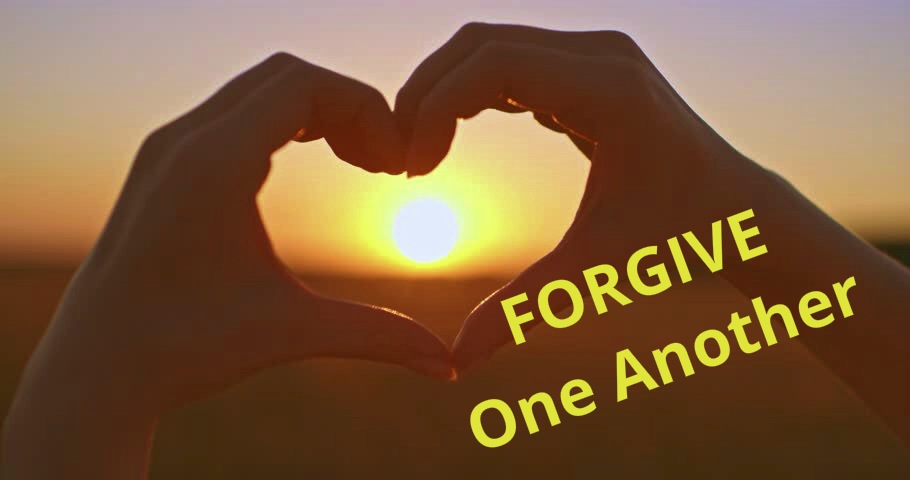We all want to be forgiven. When it comes to our own failures and shortcomings, we think that forgiveness is a mighty fine idea. However, when someone else has hurt us, betrayed us, talked behind our backs, then we’re not so keen on forgiveness. Forgiveness is not easy, that’s probably why there are so many scripture passages that try to teach us how to forgive.
The July 20th edition of our weekly newsletter, ‘We Are Not Alone’, explores the theme of Forgiving One Another. We’ve included excerpts from Paul Hutchison’s sermon on this topic as well as reflections from Mary Thomson, social worker.

Here is a brief summary from Paul Hutchison’s Sunday sermon (with apologies from Peter for any misrepresentation):
Continuing with the summer theme on “One Anothering”, Paul referenced the significant number of times the Bible uses the term ‘one another’, including versions of “Forgive one another as God has forgiven you”.
Paul remembers to this day an experience as a scout selling tickets for a pancake supper, with a reward of a Swiss Army Knife! Later that year for another event, because of a family conflict, he wasn’t able to get sponsors for Trees for Canada; and a neighbour commented, ‘You must only sell tickets for events with prizes’. But she came to their house that night to apologize for the hurtful comment. Relationships matter, and this forgiveness was remembered long after!
United Church of Canada made an apology to Indigenous Peoples for their treatment during decades of Residential Schools. Two years later the All Native Circle Conference acknowledged the apology, but hoped Actions would follow.
Paul also quoted a line from the musical Hamilton,
“Forgiveness, can you imagine. They are going through the unimaginable.”
Think of times you forgave, or asked for forgiveness? What is the difference?
“Forgiveness doesn’t get lived out in perfect environments.”
May this worship inspire us to transform lives and relationships in faith even further than before.
Mary Thomson has also offered this reflection from her experience.
Reflection from Mary:
I have heard and read a lot things on Forgiveness. I have worked with many, many people in my career as a social worker in Mental Health that are survivors of trauma – in childhood, or who have been ill-treated in adulthood by family members, romantic partners, by employers or people they thought were friends. They are angry, anxious, resentful, grief-stricken and can themselves feel guilty or worthless and somehow deserving of this treatment. I have learned that telling people to “forgive and forget” is seen an uncompassionate. It is often felt like being told to “get over it”. They almost always say “It is not so simple!”, “If I could, I would!”. And people do not ever forget this pain.
Scriptures advise us to forgive as they advise us to “Be Perfect”. I have come to understand from the biblical language used, that forgiveness, like perfection, is a journey to becoming like Jesus and something we have God’s assistance and companionship on the way. Forgiveness is a direction that we are headed in, not a destination. It is not something done once and you move on. It is really important for people to acknowledge the pain and anger of abuse and betrayal and be acknowledged with compassion before any healing can happen. Sometimes we can only do this with a supportive person, not the perpetrator of harm.
It is also important to note that we have little control over what other people do and how they see their actions. Some will never apologize or admit the consequences of their behaviour. We cannot wait for them.
So what can we do? We can try to look at the behaviour of others with some compassion, or at least acknowledge that we do not know the whole story and that we may never know Why they did such awful things, even if it hurt us. It does not mean admitting it was right or okay.
It means accepting that something occurred that had a profound impact. It also means accepting that we are resilient, capable, not deserving of harm, and not alone. We have our community and the Holy Spirit of Peace.
Forgiveness can be seen as ultimately something we do for ourselves. It allows us to put down the burden of hurt and anger and choose to continue on our journey instead of being immobilized by the burden. Anger, resentment or reliving trauma can be debilitating and interfere with living fully in the present. Choosing to move ahead, even with our wounds, takes away the power of those who hurt us to keep on hurting us. We can choose to set our burdens aside – even if this sometimes is a very long process – we may put them down and pick them up many times. But choosing gives us power.
Remember, we are not alone as we continue our life journey held in the loving arms of our Creator who became human and feels our pain.
Read the whole newsletter here.
Subscribe to our emails to read more each week.

